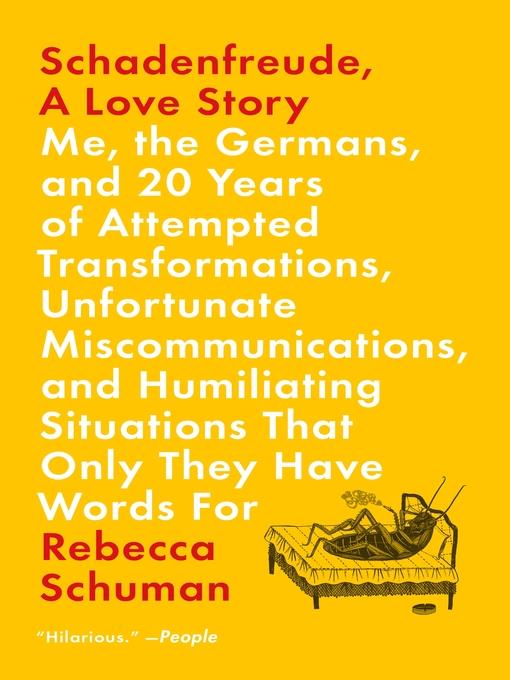
Schadenfreude, a Love Story
Me, the Germans, and 20 Years of Attempted Transformations, Unfortunate Miscommunications, and Humiliating Situations That Only They Have Words For
کتاب های مرتبط
- اطلاعات
- نقد و بررسی
- دیدگاه کاربران
نقد و بررسی

October 24, 2016
Schuman structures this disarming memoir around nine German words, including the eponymous schadenfreude (pleasure derived from another’s suffering), inviting the reader to enjoy her travails. She writes with hilarious candor about herself as an entitled teenager, complete with bleached hair and goth makeup, tormenting a German host family, and later as an assertive, vegetarian, chain-smoking 20-something sharing a loft deep in postreunification Berlin. Schuman relates her “metamorphosis into monstrous Eurotrash,” complete with clashing bright separates accessorized by multiple scarves, worn year-round, to illustrate Wohngemeinschaft, the German name for an apartment shared with someone who isn’t family. The concepts behind her selected German terms may be universal, but Schuman’s application of them is uniquely Teutonic as she weaves anecdotes with lessons learned to hilarious effect. Schuman’s journeys to Germany and her pursuit of further connection with her beloved Franz Kafka bring to mind another great travel memoirist, Geoff Dyer, writing about D.H. Lawrence. As Dyer does, Schuman entertains while relating her inner conflicts, personal and cultural hypocrisies, and overblown self-delusions during her decades-long struggle with the German language and those who speak it. Schuman’s engrossing book is a feast of honesty, humility and humor, all the hallmarks of great confessional literature.

December 15, 2016
The candid adventures of a plucky, German-obsessed American student. Slate columnist Schuman's youth in the 1990s plays out through the nine chapters of her hilarious memoir, her first book. The author titles each chapter with a relevant German word, reflecting a mood or event in her self-discovery and her vivid love for German culture, including an enduring, lifelong affinity for Franz Kafka--who, she notes, wasn't German. During her senior year in high school, this self-proclaimed "nonpracticing half-Jew from Oregon" spent her time poring over SAT practice tests and nurturing a fawning obsession with Dylan, a handsome, "so brilliant and so pained" geek who found Schuman's brainy awkwardness intellectually stimulating. But his college dreams and personal goals stagnated any progression in their relationship. The author plodded on at college as a German major and then fully immersed herself in the culture, grammar, and history of life abroad. A culture clash ensued immediately as her host family found Schuman's new "postgrunge aesthetic" quite different from her introductory photograph. Surviving on her own with a newfound independence breathed new life into her travels, and she moved into a loft residence in Berlin as a vegetarian and "moderate smoker." Highlights include a mishap involving the recovery of her lost passport, pithy social observations, and epiphanies about how hypocritical Germanic culture can be. "They will think nothing of telling you that you have gained weight," she writes, "but in other situations, they have ironclad laws of politeness." The author's comparison of Prague's post-Cold War metamorphosis to Gregor Samsa's own transformation is creatively descriptive, as is her account of her anxiety at being perceived as having Imposter Syndrome while at graduate school in Southern California. Built on her inner angst and painstaking quest for self-discovery throughout her burgeoning adulthood, Schuman's memoir is a comedic patchwork of quirky anecdotes written in smooth, sometimes-cocky prose, liberally sprinkled with free-flowing expletives and consistent sincerity. Schuman's droll, self-deprecating, wild life (so far) will find particular appeal with readers who enjoy memoirs that don't take themselves too seriously.
COPYRIGHT(2016) Kirkus Reviews, ALL RIGHTS RESERVED.

December 1, 2016
Blame Kafka. When Schuman falls for a boy with startlingly intense eyes at her high school, her infatuation with him intertwines with their discussions of the works of the writer from Prague. Her desire to read Kafka in the original German outlives her fleeting young romance and leads Schuman to major in German, take two trips to live in Germany while attending college, and eventually earn her doctorate in the language. But she finds that learning Germanand getting to know the people who speak itis no easy task. Schuman recounts her misadventures abroad, clumsily wielding her slowly growing German vocabulary, with delightfully caustic humor. Brimming with the arrogance of youth, Schuman in turn horrifies her summer-abroad host family with her slovenly behavior, cultivates a certain nostalgia for Cold Warera East Germany, and embarks upon an ill-advised romance in Prague. Her most poisoned barbs, however, are reserved for the crushing experience of earning her PhD and entering a near-hopeless job market. Schuman absolutely revels in the pain caused by her love for the German language.(Reprinted with permission of Booklist, copyright 2016, American Library Association.)

























دیدگاه کاربران